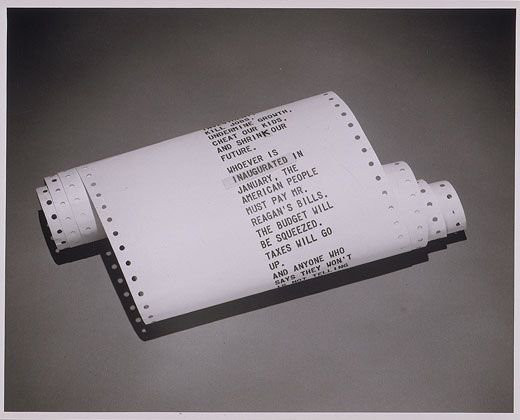Word prompter - a powerful assistant of politicians
Teleprompter (English: Teleprompter) is a display device that reminds the speaker with a text or speech presented in electronic display text.
Callers help TV MCs and presenters to host programming fluently in front of the camera without holding the script as a printout.
The prompting machine helps the user read the speech content while still looking straight at the crowd below instead of looking down at the paper , giving the audience a sense of enthusiasm to "remember" each sentence.

Photo of Obama reflected on screen prompting machine during the 2008 campaign. (Photo: Reuters).
The word prompting machine began to appear in 1948 in the form of a roll of paper placed inside half of the suitcase. Actor Fred Barton Jr. said the televised period was a big challenge for artists. More and more programs appear directly, and instead of having months to memorize the content, they have to study weekly or even daily. The word prompts are applied but still create a delay.
Barton went to see Irving Kahn, a vice president of 20th Century Fox, presenting the idea of putting together the word-for-word pieces into a roll with an auto-running motor. Kahn shared this idea with engineer Hubert Schlafly. Using half a suitcase as a cover, Schlafly attached belts, pulleys and a motor that automatically rotated pre-printed paper rolls of half an inch (1.2 cm). The scroll is rotated slowly according to the speaker's speed and is controlled by a person behind the wings.
In April 1949, Hubert Schlalfly licensed the device he called TelePrompTer . When the technology was approved, the New York Times said it would create a new era for television and politics.

Copyright of the reminder system of Fred Barton.

Part of the speech for the calligrapher of former US Vice President Walter Mondale.
However, 20th Century Fox was not interested in the tool, so Schlafly, Barton and Kahn quit their jobs and founded TelePrompTer Corporation. Initially, the device was used in television entertainment programs. Very quickly, many parties realized the usefulness of the word prompt and began to develop their own systems. The term "teleprompter " is so popular that it becomes a generic word for a prompt. Jess Oppenheimer, producer of "I Love Lucy" already owns the copyright for the first caller built into the camera, using a system of mirrors and glass panels to display the script, the dialogue right next to the tube camera glasses. As a result, readers are looking straight into the lens to interact with the audience, while still knowing what they need to say.

Former US President Lyndon Johnson used a typewriter in 1964.
In the campaign of US presidential elections in 1952, Kahn saw a great opportunity for his equipment, after learning that former President Herbert Hoover had trouble reading speeches when he joined the candidate Dwight Eiseinhower, Kahn. Go to Chicago and convince Hoover to try it out. This technology quickly created a big "hit" , 47 of the 58 speeches were made via a prompt.
Of course, at that time, the machine was bulky and everyone saw its presence. In the 60s of the last century, this problem was solved by printing content out of paper and reflecting on a thin glass placed next to the podium.
By 1982, Courtney M. Goodin created a software operating system with the ability to project text from an Atari 800 PC computer, replacing the printed scrolls that had been used for a long time. This system has the advantage that content can be edited and updated even at the last minute. However, not everything is perfect, as in 1994, prompting the letter of misrepresentation of Bill Clinton's speech to make him "compose himself" until the exact content reappears.

The speaker can choose to read the content on the screen right in front of him or through the transparent mirror placed on either side of the podium.
Currently, voice recognition software has been integrated, helping the system know which speaker is coming to automatically scroll content. It was so common in television shows and public speeches. However, many critics have said that speakers are becoming slaves of this tool. They didn't even know what they were saying, if the system rolled too fast, their voices became unnatural and if they rolled slowly, they seemed to be sleepy.
- Instructions for using Google Assistant Vietnamese
- Advanced tricks in MS Word
- Quickly translate text using Microsoft Word 2003
- Vietnam has the first virtual assistant AI
- 9 best alternatives to Microsoft Word
- 'Assistant' charting
- It's time for beautiful virtual assistants
- 'Virtual assistant' for drivers of Bach Khoa students
- Apple is coming out smart speakers
- You can detect bombs
- Some operations with the MS Word window
- Restore the original settings of Word
 'Fine laughs' - Scary and painful torture in ancient times
'Fine laughs' - Scary and painful torture in ancient times The sequence of numbers 142857 of the Egyptian pyramids is known as the strangest number in the world - Why?
The sequence of numbers 142857 of the Egyptian pyramids is known as the strangest number in the world - Why? History of the iron
History of the iron What is alum?
What is alum?